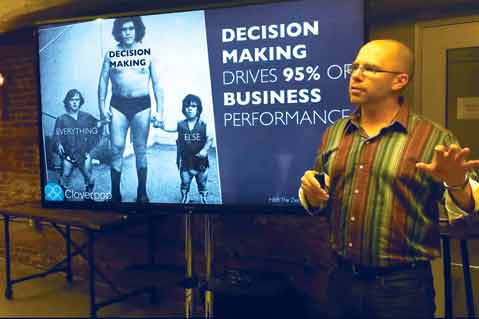Strategy March 28, 2017
Tips to Improve Your Decision-Making
Q: What are the most important factors in making better decisions?

A: There are three pieces.
1. Framing the decision properly as a decision-maker.
2. Having the team collaborate efficiently so that everybody is weighing in accurately on the decision.
3. Recording the decision so you can follow up to see if it’s going according to plan.
Q: What’s the biggest thing that derails decision-making?
A: Probably the biggest problem is not very many alternatives are considered. If someone has a typical decision to make, 96% of the time they will say “Should we …” The language means they’ve already decided, and they’ve only identified a single alternative. For people using Cloverpop, we’ve found that four alternatives is the right minimum.
Q: Why is keeping track of decisions important?
A: People just don’t notice that decision-making is something they should keep track of. We keep track of sales, clicks on our pages, how much money is coming in and going out – those all seem totally obvious. All of them are driven by the decisions that we make, and yet we don’t keep track of our decisions.
Q: When getting others’ opinions, why is a piece of software necessary?
A: When we communicate face to face and over the phone, we use a lot of emotional cues, which when it comes to decisions can often be distracting. If I’m a very charismatic and verbose person, I’m more likely to convince you of something and actually change the way you think about it. With software, you get perspectives that are much more accurate and happen much more quickly. What we found is it cuts the time to make a decision roughly in half – about four weeks (and four meetings).
Q: How does decision-making software help hidden biases go away?
A: A lot of biases fall into this category that Nobel Prize winner Daniel Kahneman calls “What you see is all there is.” If you’re really focused on hiring a person because you think she’s great, then suddenly you’re bolstering your choice all the time. What you’re not noticing is there may be a candidate who is twice as good. Cloverpop walks you through framing up the decision so you see it differently. Once that happens, the bias of what you see is all there is suddenly kicks in again. You can’t ignore what you see, and you can’t go back to the way you used to think.
Erik Larson is the founder and CEO of business decision-making technology platform Cloverpop (www.cloverpop.com). He is an MIT and Harvard MBA graduate, as well as a former executive at Adobe.
